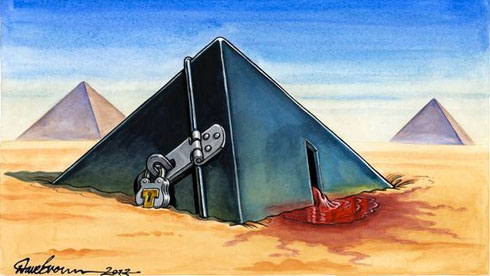No films or photographs were taken during Lady Ashton’s [30 July] visit to Mohammed Morsi, who is being held prisoner by the Egyptian generals. Nonetheless, the head of the European Union’s foreign policy department made a lasting impression with her desperate attempt to serve as a go-between. For the chance to see Morsi, three weeks ago, the representative of 507 million Europeans agreed to the conditions of the new regime and boarded a helicopter that was to take her to an unknown destination.
Now that it’s clear that her efforts were unable to prevent disaster in Cairo, this initiative is telling its full story: the story of a benevolent but weak mediator. When the EU's foreign ministers meet for a special session on Wednesday in Brussels, they must not only work out a response to the violence in Egypt, but also to this image of their own powerlessness.
Just as they have demonstrated in Syria, Europeans have shown that they cannot influence the course of events in Egypt. This is true for the Union as a whole, and for its individual members. Neither as soloists nor within the community have the Europeans been able to exert pressure that, at least in the short term, could distract the military rulers from their plan to remove the Muslim Brotherhood from the country's political map. [[Although EU Foreign Ministers can do nothing for the time being, the meeting in Egypt was still the right course of action]]. On the one hand, because nothing would be more pitiful than to resign oneself to powerlessness in the face of the many dead; and on the other hand, because it is in Europe – as utopian as it may sound – that Egypt's sole opportunity still lies. As a donor, the EU may be replaceable — by the Saudis, for example. But when it comes to showing the way forward to political modernity, the EU is irreplaceable.
Taking a step back
Shaken by the euro crisis and shocked by a Middle East in flames, Europeans have grown used to backing away from events — a response that serves to emphasise their own weakness. And there are many reasons for this weakness: such as a foreign policy Chief who comes across as an unnecessarily complicated pussyfooter, and a new External Action Service that has disappointed expectations. Then there are the national governments that pursue their own interests – sometimes ruthlessly, like the British and French, sometimes overzealously and hastily, like Germany, as steered by its Foreign Minister. Finally, no list of Europe's inadequacies can overlook its total lack of military might.
Although this may be true, we should take a step back to examine Europe's situation from a wider perspective. Military might, as the example of the United States has shown, is of little use when it comes to sorting out contemporary crises in the Arab world. Foreign policy, ostensibly poured from one mould, is no protection against disorientation – as US Secretary of State John Kerry demonstrated on the day he accidentally justified the Egyptian coup by invoking the will of the people. Only those who have no problem with violence act truly resolutely these days, as long as the violence shifts the balance of power in the region in their favour (enter the Saudis).
What the EU can deploy to powerful effect, if it can deploy it correctly, is its credibility. To do that, the Union must not pursue any "national" interest. The European interest is, rather, open to negotiation. In the case of Egypt, the justified outrage at the seizure of power by the military and the bloody suppression of the protests must be balanced against the – equally justified – desire not to leave the situation in Egypt even more chaotic. It’s a desire that worries mainly the European countries along the Mediterranean. [[In a worst case scenario, these differing perceptions will result in deadlock; in an optimum scenario, they will oblige all member states to adopt a reasonable and even credible position]].
Not taking sides
As it stands, it seems reasonable to avoid taking sides. In view of the blame that almost all of the parties in Cairo have brought down on themselves, it’s also hard to know who to back. This should not, however, be interpreted as acceptance of the dictatorship that has established itself in Egypt with the approval of at least a part of the population. Chancellor Angela Merkel and Foreign Minister Guido Westerwelle are right to press hard here. It would be absurd to nurse along the new regime with money that was meant to build democracy. This applies all the more to arms sales.
Faced with the shock of a disaster it failed to prevent, the EU should not take refuge in pure pragmatism. Credibility is a rare resource in foreign policy, because it is won back with incredible slowness. Without it, the European Union will sort out nothing in Egypt.
Was this article useful? If so we are delighted!
It is freely available because we believe that the right to free and independent information is essential for democracy. But this right is not guaranteed forever, and independence comes at a cost. We need your support in order to continue publishing independent, multilingual news for all Europeans.
Discover our subscription offers and their exclusive benefits and become a member of our community now!












